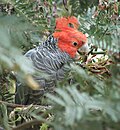Difference between revisions of "AY Honors/Parrots and Cockatoos/Answer Key"
| Line 21: | Line 21: | ||
The '''Gang-gang Cockatoo''', ''Callocephalon fimbriatum '', is member of the [[cockatoo]] family. It is a shy, mostly-grey parrot of [[Australia]]n alpine [[bushland]]. The male has a red head and [[Crest (bird)|crest]] while the female has a small fluffy grey crest. It ranges through out South Eastern Australia and [[Tasmania]]. The Gang-gang cockatoo is the faunal emblem of the [[Australian Capital Territory]]. It is easily identified by its distinctive call, which is often described as resembling a creaky gate, or the sound of a cork being pulled from a wine bottle. | The '''Gang-gang Cockatoo''', ''Callocephalon fimbriatum '', is member of the [[cockatoo]] family. It is a shy, mostly-grey parrot of [[Australia]]n alpine [[bushland]]. The male has a red head and [[Crest (bird)|crest]] while the female has a small fluffy grey crest. It ranges through out South Eastern Australia and [[Tasmania]]. The Gang-gang cockatoo is the faunal emblem of the [[Australian Capital Territory]]. It is easily identified by its distinctive call, which is often described as resembling a creaky gate, or the sound of a cork being pulled from a wine bottle. | ||
| − | Gang-gang Cockatoos require | + | Gang-gang Cockatoos require hollow tree trunks or branches to place their nesting sites. A loss of this habitat across south-eastern Australia through land clearing has led to a significant reduction in the numbers of this Cockatoo in recent years. |
==External links== | ==External links== | ||
Revision as of 22:32, 28 March 2006
The Gang-gang Cockatoo, Callocephalon fimbriatum , is member of the cockatoo family. It is a shy, mostly-grey parrot of Australian alpine bushland. The male has a red head and crest while the female has a small fluffy grey crest. It ranges through out South Eastern Australia and Tasmania. The Gang-gang cockatoo is the faunal emblem of the Australian Capital Territory. It is easily identified by its distinctive call, which is often described as resembling a creaky gate, or the sound of a cork being pulled from a wine bottle.
Gang-gang Cockatoos require hollow tree trunks or branches to place their nesting sites. A loss of this habitat across south-eastern Australia through land clearing has led to a significant reduction in the numbers of this Cockatoo in recent years.
External links
- ParrotScience - cockatoo heavy information site
- NSW National Parks & Wildlife - Proposed vulnerable species listing
- BirdLife Species Factsheet
References
- Flegg, Jim. Birds of Australia: Photographic Field Guide Sydney: Reed New Holland, 2002. (ISBN 1876334789)



